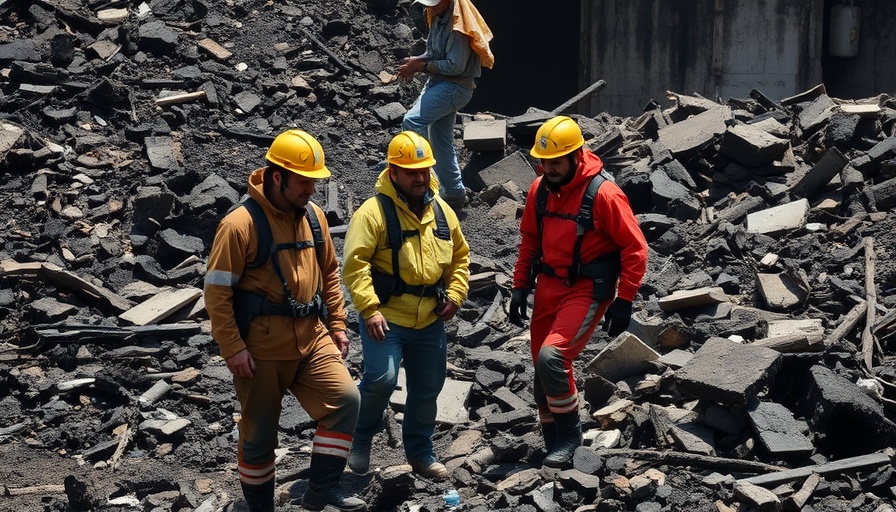
Unpacking Trump's Call for a 'Real End' to Iran's Nuclear Aspirations
In a bold statement made on June 17, 2025, President Donald Trump reinforced his administration's hardline stance towards Iran, specifically emphasizing the need for an unequivocal end to Tehran's nuclear ambitions. Trump asserted, "Iran cannot have a nuclear weapon. It’s very simple. You don’t have to go too deep into it, they just can’t have a nuclear weapon. An end. A real end. Not a ceasefire. An end." This call for clarity signals a request for decisive action, rather than a temporary solution.
Context Amidst Chaos: Iran's Military Fallout
The backdrop to Trump’s remarks cannot be overstated. In recent weeks, the Iranian Red Crescent Society reported significant civilian casualties, with at least 224 deaths attributed to escalating hostilities, including a targeted Israeli airstrike that decimated key military leadership in Iran. The intensive bombardment comes amid Israeli claims that Iran was on the verge of developing nuclear weapon capabilities, prompting Israel to take what it considers preemptive actions.
Exploring the Implications of Escalating Tensions
As tensions flare, the broader geopolitical landscape could be at stake. The Israeli strikes have rattled Iran's military integrity, creating a precarious balance in the Middle East. Trump's insinuation about knowing Iran's leadership locations—"We are not going to take him out (kill!), at least not for now"—speaks volumes about the U.S.'s readiness to re-engage with direct measures if necessary. Reports indicate that Israel's operational dominance in Iranian airspace is a pivotal factor, allowing it to continue its offensives with little opposition.
Global Perspectives: The Intersection of Diplomacy and Military Strategy
With international scrutiny intensifying, Trump's approach may represent not only a call to arms but also a reflection of the ongoing anxieties that define U.S.-Iran relations. In an era where nuclear capability acts as both a deterrent and a bargaining chip, the negotiation landscape remains intricate. Critics argue that the strategy of pressuring Iran could reduce the possibilities for diplomatic solutions, instead igniting further military confrontation.
Economic Ramifications: A Cautionary Tale for Global Markets
The implications of these military engagements extend into economic forecasts. As nations watch the unfolding events, fluctuations in the stock market and concerns over oil prices are likely to rise. Escalating conflict in the Middle East has historically led to disruptions in global oil supply; therefore, investors remain cautiously observant. Moreover, Iran's response to Israel’s aggressive stance could fuel further retaliations that destabilize the region’s economic landscape.
Civilian Impact: The Human Cost Behind Political Maneuvering
The civilians caught in the crossfire of this political chess game bear the brunt of military decisions. The Iranian missile strike on an Israeli city has already resulted in tragic civilian casualties, including a devastating attack that claimed the lives of four women from the same family due to the escalation of hostilities. The ongoing conflict raises critical questions about humanitarian considerations amidst governmental defense directives.
What Lies Ahead: Predictions on the Future of U.S.-Iran Relations
Looking ahead, it appears the call for a "real end" to nuclear disputes suggests a potential for reconsidered U.S. military strategies that might stray from mere sanctions to more direct interventions if tensions escalate further. Therefore, professionals engaged in policy-making must navigate between diplomacy and defense, analyzing risks and benefits amidst an unpredictable geopolitical framework.
In conclusion, the call for a decisive end to the nuclear crisis in Iran by President Trump reflects a critical juncture in U.S. foreign policy. As military and civilian impacts intertwine with economic forecasts, the necessity for a pragmatic approach remains; finding stability in an increasingly volatile landscape will be paramount.
With a comprehensive understanding of the international dynamics and humanitarian implications tied to these developments, informed discourse must continue in hopes of achieving a peaceful resolution. The intricate balance of power, national security, and human rights will be pivotal in shaping what comes next.
 Add Row
Add Row  Add
Add 




Write A Comment